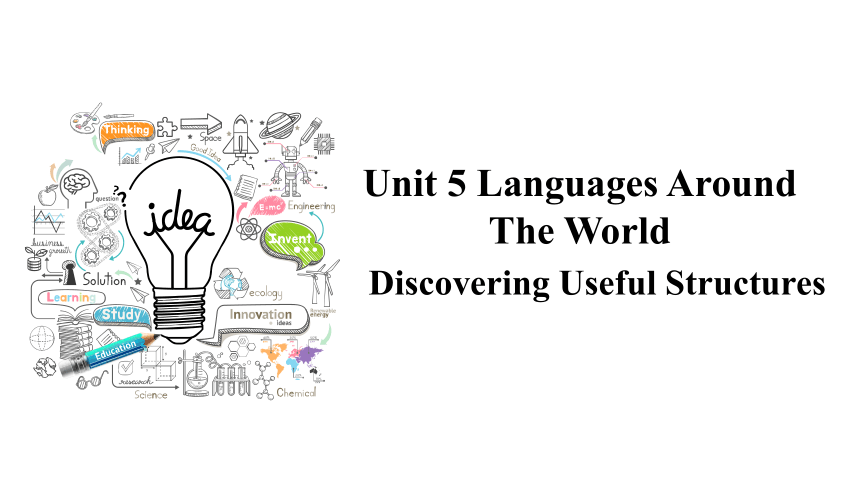(
课件网) Discovering Useful Structures Unit 5 Languages Around The World To learn the restrictive relative clauses with when, why, where, in/at which. To use the restrictive relative clauses to give reasons. Learning objectives 1. It was a time when people were divided geographically. 2. Emperor Qinshihuang united the seven major states into one unified country where the Chinese writing system began to develop in one direction. Look at these sentences and underline the restrictive relative clauses. What kind of information does each clause communicate a time for an event a location for an event 1 3. There are many reasons why people learn a foreign language. 4. These were animal bones and shells on which symbols were carved by ancient Chinese people. a reason for an action a location for an action This is our school _____ we study and make friends. Change two simple sentences into a restrictive relative clauses. 2) We study and make friends in this school. where 1) This is our school. 1) We still remember last weekend. 2) We enjoyed ourselves in the woods last weekend. We still remember last weekend _____ _____. when we enjoyed ourselves in the woods Fill in the table to complete each phrase with a restrictive relative clause. the day when the reason why the place where the place/time in/at which the earthquake happened I didn’t get a pay-rise my friend lives I found Grandma’s glasses 2 Use the phrases to make complete sentences. I was on holiday the day when the earthquake happened. I don’t know the reason why I didn’t get a pay-rise. She works near the place where my friend lives. This is the cupboard in which I found Grandma’s glasses. the day when the reason why the place where the place/time in/at which the earthquake happened I didn’t get a pay-rise my friend lives I found Grandma’s glasses Review: What is a restrictive clause structure 在复合句中, 修饰某一 _____ 或 _____ 的从句叫定语从句。被修饰的名词或代词叫 _____ , 定语从句一般放在先行词的_____ , 引导定语从句的词叫做 _____。 先行词 后面 关系词 名词 代词 先行词 关系词 定语从句 + + 关系代词 关系副词 (which, who, whom…) (where, when, why) Lead-in 关系代词 指人 指物 who (主语,宾语) whom (宾语) whose (定语) that (主语,宾语) whose (定语) that (主语,宾语) which (主语,宾语) 关系 代词 指代 在定语从句中所充当的成分 人 物 句子 主语 宾语 定语 who whom which that whose The usage of the relative pronouns 1.They are the survivors _____ home was destroyed by the earthquake. 2.The terrible shaking of the building woke up all the people_____ were asleep. 3.The next day people put up shelters in the open air made with anything _____ they could find. 4.A number of children _____ parents had died in the quake were sent to live with families in other cities. 5.This frightened boy _____ mother was lost in the disaster is looking for her now . 6. This is the young man _____ saved people trapped under ruins. 7.Several days later most of the ... ...

